Where to Find Bamboo in Massachusetts
Bamboo is not native to Massachusetts, however, there are a few bamboo species that can grow in this New England state, despite the colder weather. Even though most of the species of bamboo that landscapers like to plant are not native to the United States, choosing the right cold-tolerant variety can allow you to enjoy the benefits of bamboo in your own home or garden even in Massachusetts.
Around the world, bamboo is a popular choice in a variety of landscapes and gardens. Throughout history and into modern times, cultures across the world have used bamboo for many purposes. From making it a material for construction, tools, art, or even musical instruments, bamboo’s versatility as a renewable resource have made it a popular crop. Since it can also form a thick forest-like grove, many landscapers also love bamboo for use as a privacy screen or garden feature.
This article covers all of the important details you should know before cultivating bamboo in Massachusetts. To help you learn whether or not it is worth cultivating it yourself, this article will review both the challenges and potential benefits of growing bamboo. Lastly, we’ll discuss places such as botanical gardens and arboretums within Massachusetts where you may view bamboo first-hand. These places may be both a source of gardening inspiration and of education. Let’s get started by discussing the basic facts of bamboo plants. From there, we can then explore some specific considerations for growing bamboo in Massachusetts
What is Bamboo?
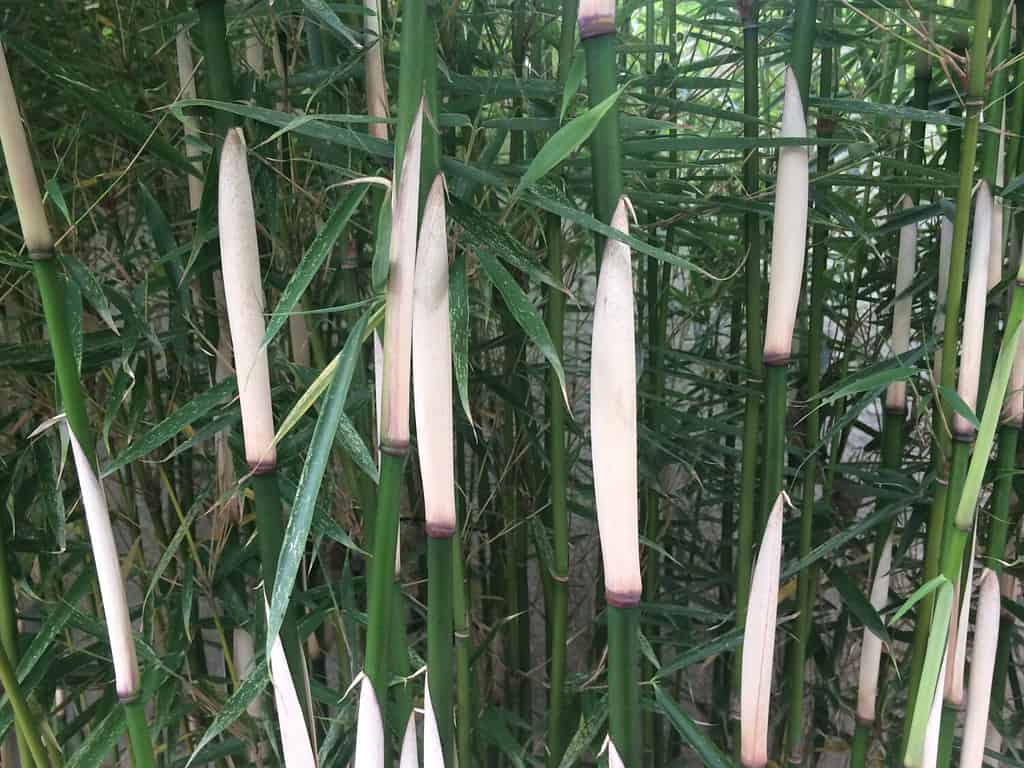
©Egeria/Shutterstock.com
Did you know that the word “bamboo” actually applies to more than 1,000, and maybe as many as 2,000, plants known as bamboo? Across over 100 different genera, these plants are members of the grass family Poaceae. These many different species do have some shared qualities. Bamboo species usually have thin, tall stalks known as culms. Lush green foliage tops the plants. Though bamboo comes in different sizes and a range of colors, with varieties that grow well in different climates and environments, most bamboo species grow quickly and are resilient.
In Massachusetts, some of the more common bamboo varieties are cold-tolerant species. These include some species from the Fargesia and Phyllostachys genera, which tend to withstand cold temperatures well. A few popular varieties in these genera include Fargesia robusta, Fargesia murielae, Phyllostachys aureosulcata, and Phyllostachys nigra.
Since they can grow very rapidly, before you plant bamboo, you should know whether the species you have chosen is a “clumping” bamboo or a “running” bamboo. Clumping bamboo grows in clumps. Running bamboos shoot out “running” rhizomes that allow the plant to send up new stalks as it spreads underground. When running bamboo species are planted and not contained by a pot or other barrier, they can easily spread weed-like through a yard or garden. This can be particularly problematic when a running bamboo grows outside of its native environment. In places like the U.S., bamboo can become invasive and detrimentally impact the ecosystem. For this reason, many experts recommend planting only clumping bamboos, which can be easier to manage.
Uses for Bamboo
Throughout human history, people have used bamboo for a wide range of culinary and cultural traditions as well as many more practical uses. Bamboo can be used in building construction, to make fishing rods, in weaving, for tools like chopsticks, or for fiber weaving to make clothes and textiles. Since bamboo culms are hollow, they can also be made into instruments such as rattles, drums, and flutes. Yet this list is still not complete – there are many other ways that people use bamboo on a daily basis. Visit your local grocery store and the odds are that you will find an assortment of bamboo-based products, from drinking straws to edible canned bamboo shoots. These diverse uses make bamboo an important renewable resource with agricultural value in addition to its landscaping uses.
Challenges of Growing Bamboo in Massachusetts
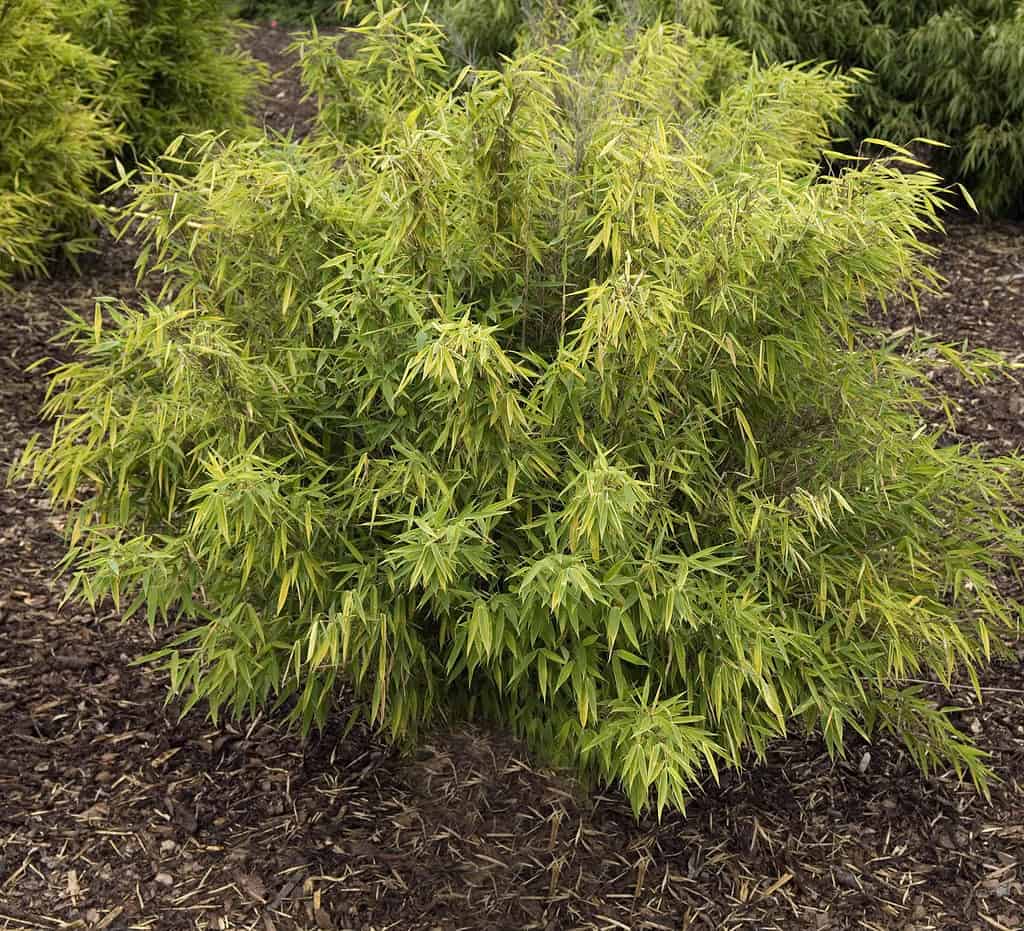
©Manfred Ruckszio/Shutterstock.com
Although you can grow bamboo in Massachusetts, you should prepare to encounter quite a few challenges. These include it being an invasive species, cold winter weather, local soil conditions, storms and weather conditions, pests and diseases, and potential laws and regulations.
Beyond challenges you experience, you should also keep in mind that although bamboo grows throughout many parts of North America, these are species originally imported from other parts of the world. Even when you see bamboo growing out in a nature preserve or park, the plants are not native to the area. Because of this, planting bamboo recklessly can negatively impact the local ecosystem if it spreads beyond your yard or original area. To keep bamboo from impacting your nearby plant and animal life, select a non-invasive bamboo species. Using a clumping species makes it easier to contain compared to a running bamboo. Lastly, you can use pots and underground physical barriers to contain any bamboo plants you choose.
With that in mind, let’s discuss some of the difficulties you may encounter when attempting to cultivate bamboo in Massachusetts.
Legality of Growing Bamboo in Massachusetts
Many city and state governments put restrictions on which plants are allowed to grow within their limits. Since bamboo is potentially invasive, some local areas have laws limiting where and when it may be planted. Ensure you stay within the local laws by speaking with the local authorities or plant experts before planting bamboo in your yard.
Biggest Challenges to Growing Bamboo in Massachusetts
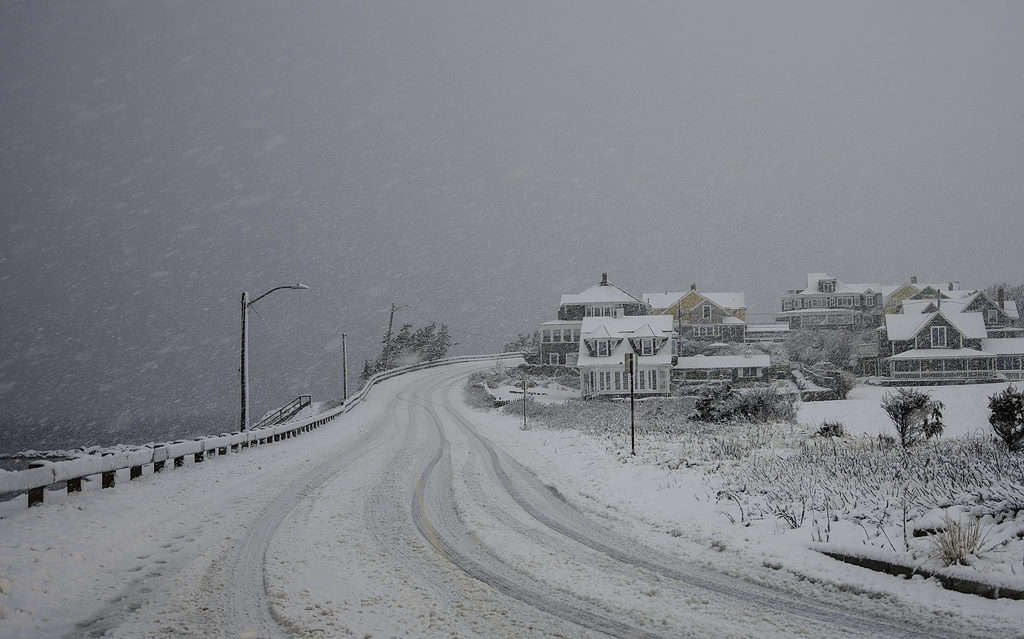
©iStock.com/Sanghwan Kim
First, Massachusetts has cold winters often characterized by large amounts of snow and ice. Since not every bamboo species can survive below-freezing temperatures, it is important that you choose a cold-tolerant species that will withstand Massachusetts’ cold winter weather.
Second, bamboo grows best in fertile, moist, well-draining soil. Massachusetts’ soil varies by specific region, and has soil ranging from clayey to acidic. You can help the bamboo you plant to thrive by testing your soil and fertilizing or adjusting the soil as needed according to expert advice.
Third, Massachusetts commonly has rain and snow storms that include strong winds. This kind of weather may damage your bamboo. This can lead to bamboo culms bending or breaking, or simply sustaining damage over time. You can help your bamboo avoid damage from windy weather by planting it in places with wind protection from a building, fence, or other barrier.
Fourth, bamboo, like other plants, can be damaged by pests and disease, such as mites, aphids, root rot, and other fungal diseases. In Massachusetts, you should also look out for caterpillars, which can quickly destroy plant foliage. Additionally, fungal diseases like root rot may occur when the plants are not rooted in good and well-draining soil. Each of these factors can damage your bamboo, so monitor the plants regularly. Maintain regular fertilization, pruning, and other management practices to keep your plants healthy from disease and pests.
By keeping aware of potential challenges you might encounter and responding proactively, you will increase your chances of successfully growing bamboo in Massachusetts.
How to Grow Bamboo in Massachusetts
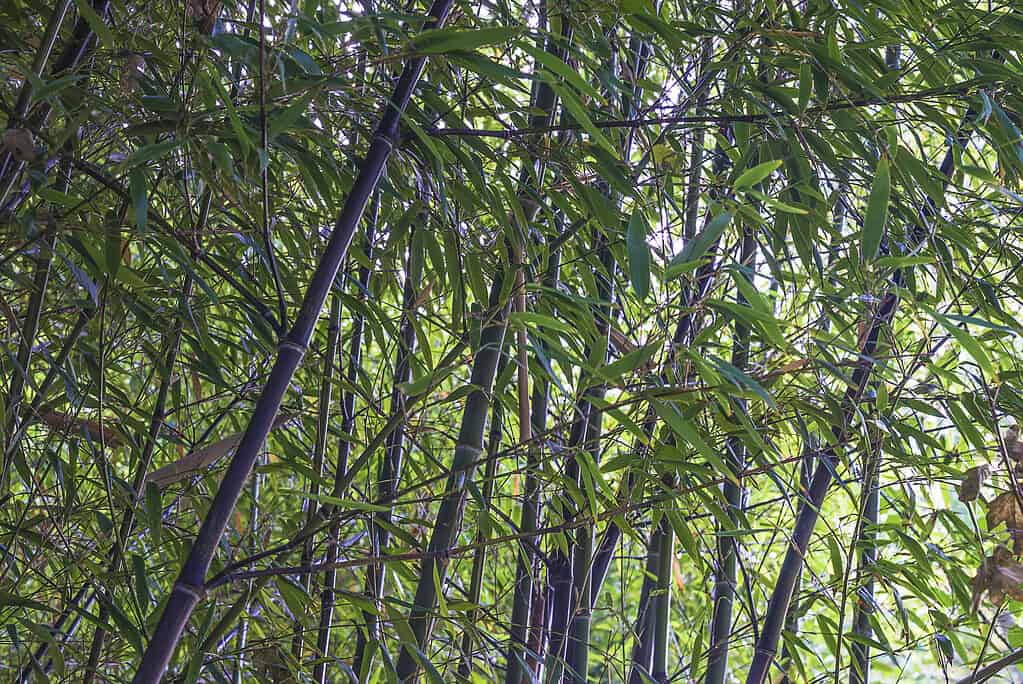
©iStock.com/stsvirkun
If you still want to grow bamboo despite these challenges, follow these tips to help you do so effectively in Massachusetts.
First, choose a species that fits with Massachusetts’ climate and other environmental conditions. Consider relevant factors such as your yard’s soil, the climate in your area, where you hope to plant your bamboo grove, and any preferences you have for the bamboo’s appearance and size.
Next, you should try to plant your bamboo grove in a place with fertile, well-draining soil, and sunlight. Water the bamboo regularly to maintain its moisture, which is especially important when it is getting established. You may want to plant your bamboo during the warmer spring or summer months to give it a chance to become established before winter temperatures and storms.
Once the bamboo is established, regularly prune and thin your bamboo to remove dead culms. Pruning will not only encourage healthy growth, but will also give you the opportunity to monitor the plants for pests or diseases. You can maintain your bamboo by also containing its spread and placing physical barriers to keep it from growing beyond the limits of your yard or garden.
Benefits of Growing Bamboo in Massachusetts
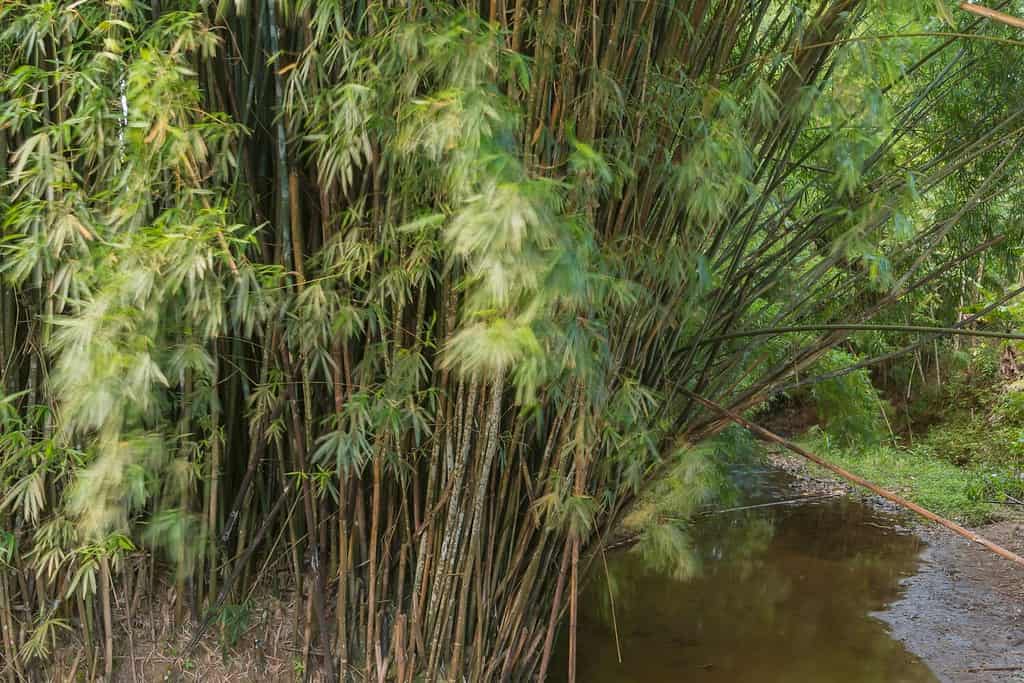
©Stefan Lambauer/Shutterstock.com
Despite the challenges you may encounter, there are also quite a few benefits to growing bamboo. These include its aesthetic and practical benefits and positive environmental impacts.
In addition to being beautiful and rapidly-growing plants, bamboo can give your yard or garden a privacy screen, shade from the sun, and wind protection. Your yard can become a tranquil oasis with bamboo sheltering you from the heat and dampening noise from busy streets. Bamboo groves can also become wonderful habitats for birds, insects, and animals!
You also do not want to overlook the positive environmental impact of planting bamboo. The dense but shallow root systems can help to reduce erosion in the ground by stabilizing the soil. Since bamboo also filters out pollutants in the air, you may also find that the bamboo cleans your air of elements such as carbon dioxide.
Since bamboo is beautiful and relatively low-maintenance, many people love incorporating bamboo plants into their gardens and conservatories. Whether you love its practical uses, enjoy its aesthetic appeal, or want to make a good environmental impact, you can find that cultivating bamboo in Massachusetts can bring many benefits!
Bamboo Arboretums and Gardens in Massachusetts
Before you try growing your own bamboo grove in Massachusetts, a good place to start is by learning how other people in your state grow and care for bamboo plants in this region of the United States. Seeking expert advice from a horticulturist or another plant expert can also help you choose the right bamboo species for your purposes. Once way to find these people is by going to a university agricultural extension, shopping at a plant nursery, or visiting a local arboretum or botanical garden.
Since bamboo does not grow natively in Massachusetts, it would be unusual for you to find bamboo plants in wilderness areas. However, you may find bamboo plants incorporated into special exhibits at botanical gardens, educational facilities, arboretums, zoos, state parks, and more. Visiting one of these places is a great way for you to gain education about bamboo while getting the chance to connect with a local expert.
Many of these places exist for educational purposes to teach about plants and instill a passion for the environment. Some of them may even have special events focused on bamboo! To connect with learning opportunities, the next part of this article will include places where you can see bamboo growing in your state of Massachusetts.
Botanical Gardens and Arboretums
Massachusetts is home to several botanical gardens and arboretums, some of which may offer bamboo species on display. Included below are a few notable gardens for you to consider visiting.
Berkshire Botanical Garden
The Berkshire Botanical Garden in Stockbridge is a 24-acre botanical garden with over 3,000 different plant species on-site. The Garden’s mission is to “fulfill the community’s need for information, education and inspiration concerning the art and science of gardening and the preservation of our local environment.” The Berkshire Botanical Garden includes dozens of unique garden spaces. Visitors can enjoy strolling through the gardens and observing various bamboo species.
The Garden is open from April 29 through October 31 from 9 to 5 p.m. General admission is $18, seniors are $16, and children aged 12 and under are free.
The Botanic Garden of Smith College
The Smith College Botanic Garden in Northampton seeks to teach people about plants, people, and place. The Garden includes over 7,200 different plants and encompasses both diverse outdoor gardens and greenhouses. The bamboo garden allows visitors to explore different bamboo varieties and learn about their growth habits. The bamboo species on-site include at least 10 species in the Poaceae family.
The Garden’s regular hours are from 9 a.m. to 4 p.m. every day except for major holidays and during the Smith College holiday break. Admission is free, though there is a suggested donation of $2.
New England Botanic Garden at Tower Hill
The New England Botanic Garden at Tower Hill is a 171-acre botanic garden that offers visitors formal gardens, woodland areas, and a visitor center. With regularly educational opportunities, the Garden features a priceless collection of plants, special exhibitions, and opportunities to enjoy the farm-to-table café. Among the special gardens is one that showcases bamboo along with other Asian plant species, providing a serene environment for visitors.
The New England Botanic Garden at Tower Hill is open from 10 a.m. to 5 p.m. daily, with the exception of Thanksgiving, Christmas Eve, Christmas Day, New Year’s Eve, and New Year’s Day. Admission is $19 for adults, $16 for seniors aged 65 and up, $9 for children aged 4 to 12, and free for children aged 3 and under. Dogs may be admitted for a fee of $8.
The Arnold Arboretum of Harvard University
The Arnold Arboretum of Harvard University in Cambridge is a 281-acre landscape of over 15,000 plants for visitors to explore. This “museum of trees teaching the world about plants” is a great place for a stroll, to watch the wildlife, or to learn about the stories and science of plants. The Arnold Arboretum features a collection of woody bamboo species. Visitors can explore the arboretum’s extensive grounds and encounter bamboo specimens throughout the landscape. Look for the large sprawling bamboo grove of Phyllostachys dulci!
The Arnold Arboretum is open every day. It is free to visit.
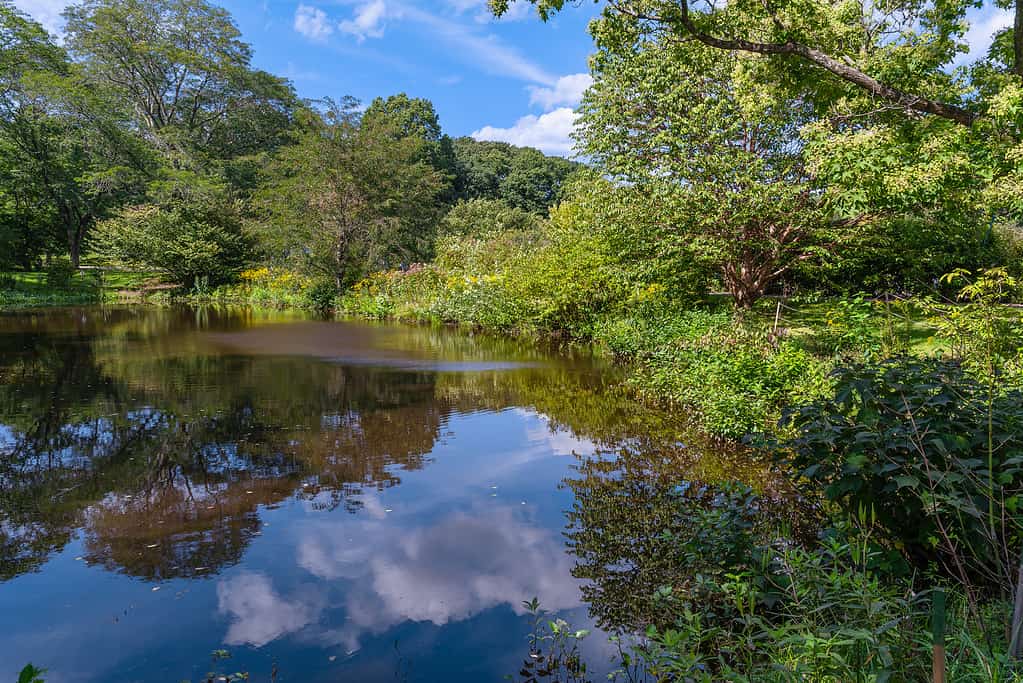
©iStock.com/Sergey-AND-Marina
Other Places to Find Bamboo in Massachusetts
Do keep in mind that some of these botanical gardens and arboretums might have specific bamboo sections or limited displays and not dedicated bamboo gardens. Before you visit, check the websites linked above or give them a call to ask questions about their bamboo collections and other plants on display. Also remember that these gardens may change their hours or rotate specific displays over time, so it is always a good idea to confirm current exhibits and hours before planning your visit.
In addition to the places included above, you may also find other ways to see bamboo in Massachusetts. One strategy could include connecting with gardening groups, horticultural societies, and estate associations. These can be good ways to discover special events and private gardens and estates that showcase tropical plants. These kinds of associations may host events at places that would normally be closed to the public, but allow you to visit homes and grounds on certain occasions.
Additionally, since many people enjoy planting and cultivating bamboo, there are often plant nurseries and commercial garden centers that sell bamboo.
The post Bamboo In Massachusetts appeared first on AZ Animals.
from Animal News, Facts, Rankings, and More! - AZ Animals https://ift.tt/ib0UlQv